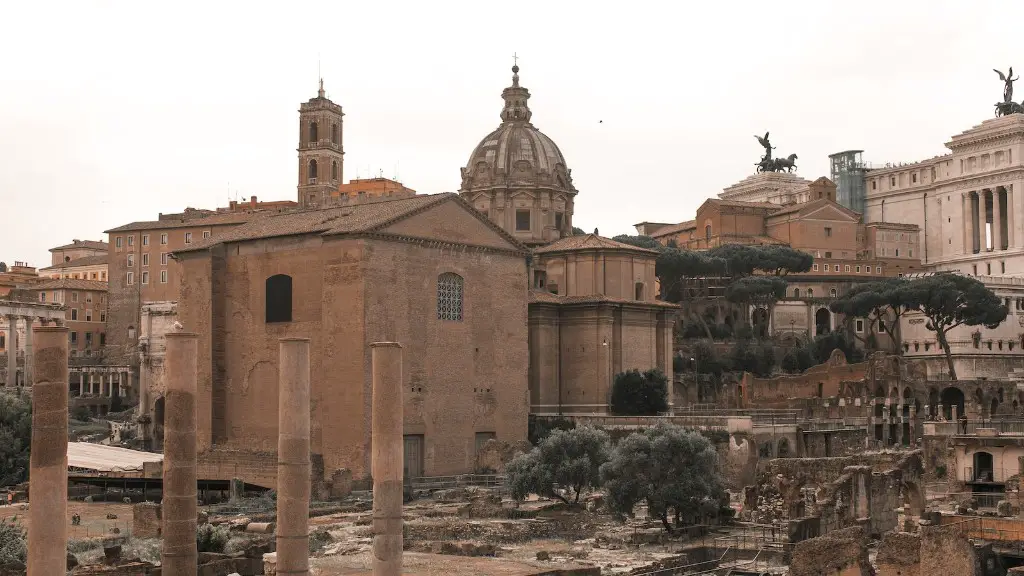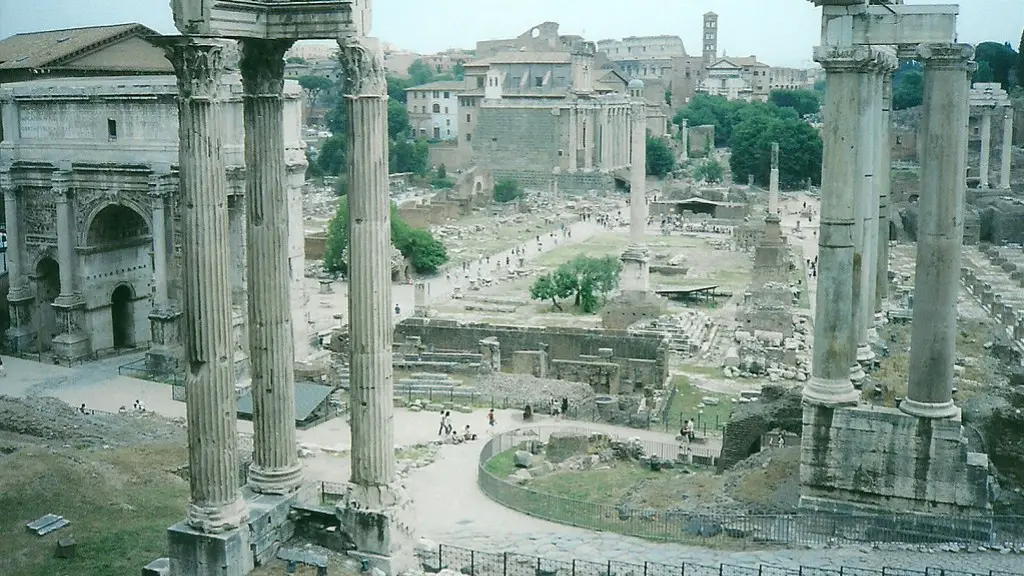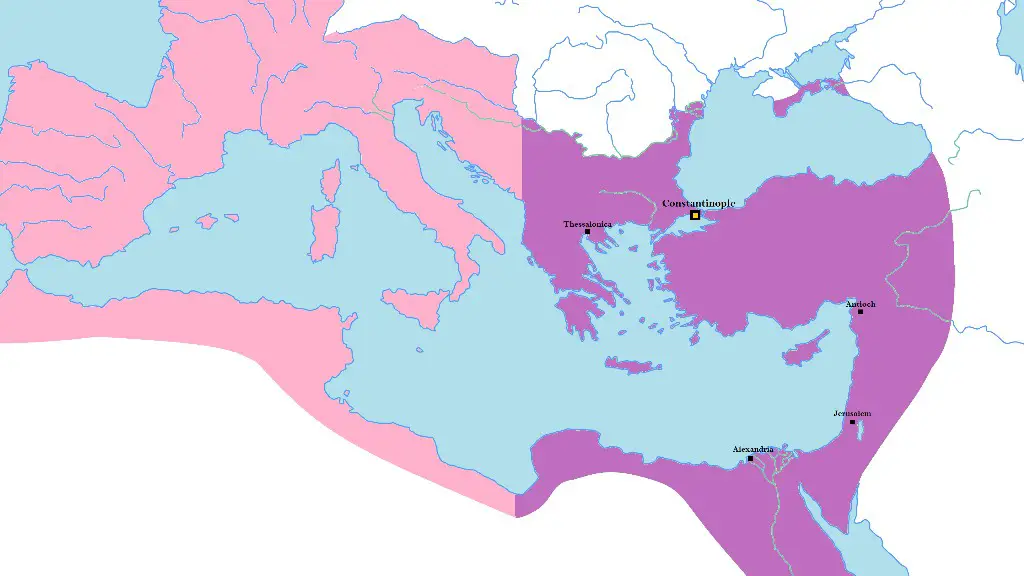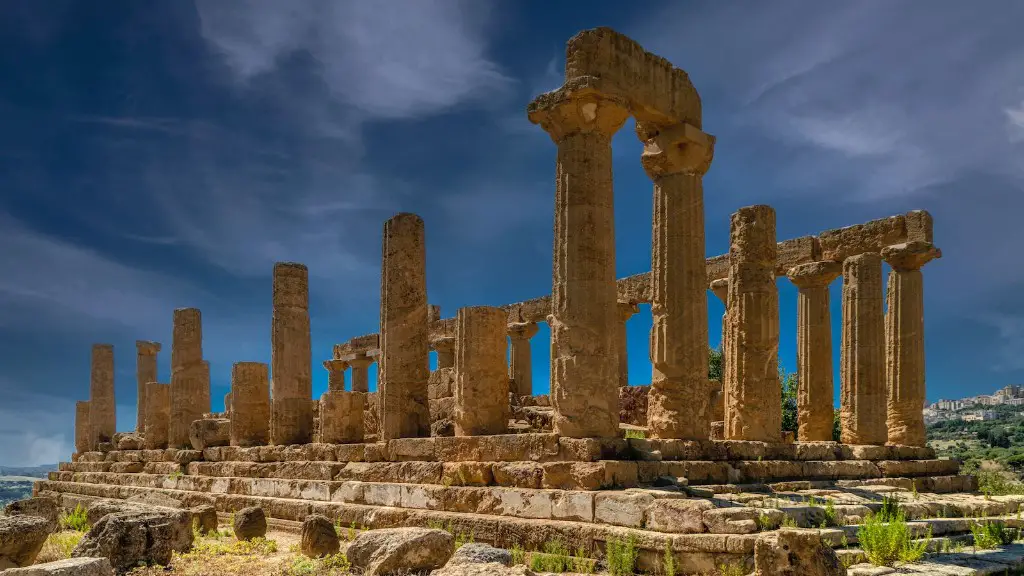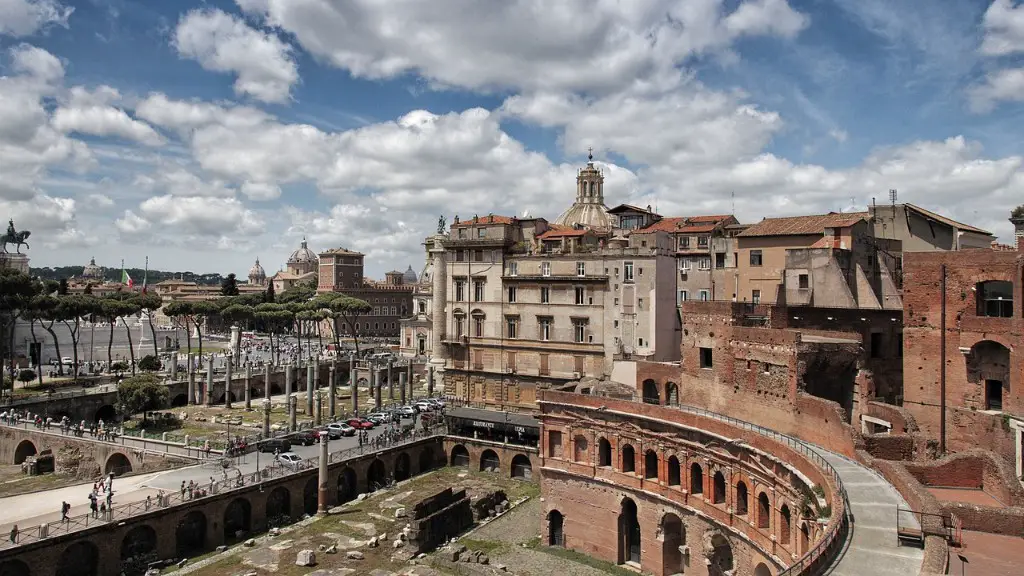Ancient Rome has long been hailed as one of the most powerful and influential civilizations of the past. It is impossible to overstate the importance of Rome in the annals of world history, and its impact can still be felt even today. The Roman Empire was an ambitious project, reaching far and wide and having an impact on countless generations of people. It set the groundwork for many of the principles and beliefs that people still adhere to and for the political, social, and cultural norms that people all over the world take for granted. Understanding why Ancient Rome is so important to history is key in order to properly appreciate the remarkable contributions that it made to world history.
The most important contribution of the Roman Empire was its highly centralized system of governance. This is the same system of government that is used in nearly all countries today, and it was developed and perfected by the Romans. Through their system of government, the Romans were able to maintain order across their vast empire. This also enabled them to create cohesive and robust economic and political systems that could be utilized to maintain their power. Furthermore, the Roman legal system was also incredibly advanced, laying the foundation for the development of laws and civil rights that are still in place today.
The legacy of the Roman Empire is also seen in its military might. The Roman Legion was arguably the most proficient and successful military force of its time. It was considered to be well-disciplined and well-trained with advanced strategies and tactics that enabled them to conquer and control vast regions of Europe, the Middle East, and Northern Africa. The influence of the legion was also felt on a more intimate level as its soldiers were able to interact with the locals and teach them the Roman customs.
The Roman Empire also had a significant impact on language and literature. Latin is a language still spoken in many parts of the world, largely due to its prominent status as the language of ancient Rome. Latin was a language of considerable power and influence, having been the language in which many of the most influential works of antiquity were written in. Furthermore, it was a language which was taught to and continued to be used by legal and religious professionals for centuries after the fall of the Empire. To this day, Latin is still an important language and is the source of many modern words and phrases.
Ancient Rome is also remembered for its many architectural feats, which have long been seen as marvels of engineering and design. Many of the buildings, monuments, and roads that are scattered throughout Rome are still standing today, and they provide a sense of awe and wonder as one enters the city. The Colosseum and the Pantheon, for example, are among the most impressive feats of engineering in the world, and they have become important symbols of Rome’s power and influence. The grandiose scale and intricate details of these structures create an atmosphere of reverence and appreciation for the accomplishments of ancient Rome.
The legacy of Ancient Rome is also seen in their art. While art from this era is often seen as primitive and barbaric, the Romans were in fact quite adept at sculpting and painting, and they created some truly beautiful works of art. Many of the sculptures seen in Rome’s public squares and monuments are considered to be masterpieces, and they have become iconic images of Rome’s past. Additionally, their paintings show off their deftness and skill with color, texture, and line.
The importance of Ancient Rome to world history cannot be understated. Its immense power, its advanced system of governance, its influential military, its lasting language and literature, its stunning architecture, and its astonishing artwork are all reflections of the remarkable accomplishments of this extraordinary civilization. Ancient Rome was an incredible and influential society, and its legacy still serves as a reminder of its great achievements.
Influence of Roman Law
Roman law is one of the most important legacies of the Roman Empire. The Romans developed and codified their laws, which made them easier to enforce and easier to understand. This development of laws was crucial for the Romans as it allowed them to maintain order throughout their massive empire. Roman law was extremely influential in the development of modern-day legal systems, as many of the same concepts and laws are still in use in many countries today. In addition, Roman law inspired the development of fundamental legal principles such as innocent until proven guilty and the right to a fair trial.
The basis of Roman law was found in the Twelve Tables, which were inscribed onto tablets of bronze in the 5th century BC. These laws laid the groundwork for Roman society and were used as the basis for all criminal law. This law laid down the basis for the punishments that were used throughout the Empire and serves as the basis for modern criminal law. This also laid the groundwork for the concept of tort law, which is the branch of law dealing with civil wrongs such as negligence, trespass, and nuisance.
Roman law also laid the groundwork for the idea of political rights. In Rome, all people had a voice and a say in how their government was run. This was a radical concept at the time and was adopted in many parts of the world. The concept of democracy was first developed in Rome, and the principles of democracy have been utilized in numerous countries ever since. This was a radical development that laid the groundwork for the rights that are still enjoyed by people around the world today.
Overall, it is clear that the Romans made significant contributions to the development of laws and legal systems. Without Roman law, the modern-day legal systems that we have today would not exist. It is an important contribution to world history, and its impact is still felt even today.
Impact of Roman Religion
The religion of Ancient Rome was an important part of the society. Religion was deeply entwined with Roman life, as it was seen as a way to ensure success in war, in business, and in daily life. As such, Religion had a powerful influence on the Roman Empire, both domestically and internationally.
The multiple gods and goddesses of Roman religion were a source of strength for many of the faithful. At home, temples were built in honor of the gods, and people would make offerings and sacrifices in their honor. For many Romans, their gods were a source of hope and guidance in times of difficulty and turmoil. Religion also had a strong influence on foreign relations, as many of the conquered lands had their own gods and goddesses. Through these religious interactions, the Romans spread their culture and beliefs to other parts of the world.
Perhaps the most important legacy of Roman religion is its influence on the development of Christianity. Christianity was first brought to the Roman Empire by the Apostle Paul and ultimately spread throughout the Empire and beyond. Many of the doctrines and beliefs of Christianity were heavily influenced by Roman religion, including worship of a single god and veneration of saints. Furthermore, the coronation ritual used by the Pope to this day is taken from the system of martyrdom used by the Romans for their gods.
While religious practices and beliefs in Ancient Rome are no longer practiced, the legacy of Roman religion can still be seen in the world today. Its influence on Christianity is especially prominent and was an important factor in the spread of the religion to many parts of the world. Thus, the religion of Ancient Rome is an important contribution to world history.
Perspective of Classical Historians
Classical historians are generally in agreement that Ancient Rome was an incredibly powerful and influential civilization. They see Ancient Rome as a crucial turning point in world history, having had a monumental impact on the later development of western societies. Many of the principles and ideas that can be seen in modern-day western societies have Ancient Roman origins. Furthermore, classical historians often point to the impressive feats of engineering, art, and culture as proof of Rome’s power and influence.
The classical historian Edward Gibbon is especially well-known for his admiration of the Roman Empire. He wrote extensively about the contributions of the Empire, detailing the impressive accomplishments of its citizens. He goes on to explain that the collapse of the Roman Empire led to the “dark ages” which brought about huge changes in the way the world was governed. Many classical historians view the fall of Rome as one of the most significant events in world history, and they go on to point out the far-reaching effects of its demise.
Overall, classical historians are generally in agreement that Ancient Rome is an incredibly important part of world history. They point to its vast contributions to the world, including its system of government, its advanced legal system, its military prowess, its language and literature, its remarkable architectural feats, and its stunning artwork. Through their writings, these historians have given us a glimpse into Ancient Rome and the impressive contributions that it made to the world.
Modern Day Appreciation for Roman Art
The art of Rome is appreciated around the world today. Its unique style of painting, sculpture, and architecture has resonated with countless generations of people and still continues to do so. There are numerous museums across the world dedicated to displaying Roman art, and many of the pieces are seen as iconic examples of ancient art. In addition, many sculpture parks also feature reproductions of famous Roman statues and monuments.
In addition to its physical representation, Roman art is also praised for its influence on modern art. Artists have been inspired by Roman artwork when creating their own works of art, and some have even sought to recreate some of the most famous Roman sculptures and frescoes with modern materials. Additionally, some modern art movements have been influenced by Roman art, such as the Baroque and Rococo styles.
Overall, modern appreciation for Roman art has remained strong. It is still seen as an incredibly important influence on the development of art in Europe and beyond. Its unique style and distinct personality have resonated with generations of artists, providing them with the inspiration to create their own works of art.
Sites in Rome and Their Relevance Today
Rome is filled with sites of incredible historical significance. Many of the structures that are still standing in the city today date back to the days of the Roman Empire, and they provide visitors with an insight into the remarkable culture of Ancient Rome. Among the most popular sites are the Colosseum, the Pantheon, the Forum Romanum, and the Baths of Caracalla.
The Colosseum is one of the most iconic structures of Ancient Rome, and it still stands as a symbol of the Empire’s might and power. Its imposing presence provides visitors with a clear reminder of the famous gladiatorial games that took place within its walls. Similarly, the Pantheon is an architectural marvel, having been built in 118 AD to honor all of the gods. It is considered to be one of the most well-preserved buildings from antiquity and a testament to the ingenuity and skill of Roman architects.
The Forum Romanum was the center of Roman politics and public life, and it is still heavily visited today. It is a remarkable site, having survived numerous wars and earthquakes. It is also a major tourist attraction, and it serves as a reminder of the grandeur and elegance of the Roman Empire. Lastly, the Baths of Caracalla were once the largest public baths in the Roman Empire, and they are an impressive site to behold. They underscore the importance of bathing and cleanliness in Roman society.
Overall, visiting Rome is a great way to gain insight into Ancient Rome and appreciate the legacy of this remarkable civilization. The sites in the city remain powerful reminders of the might and influence of the Roman Empire, and they are a must-see for anyone looking to understand and appreciate the history of this amazing civilization.
